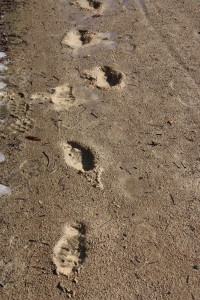For those of us who are drawn to flowing water, a spring thaw holds special allure. I took a late-afternoon walk today through the village of Kendall, six miles upstream from my home. There the Baraboo River, barely three miles old, gushed noisily between its soggy banks. I could see how far the stream had risen by the number of saplings that were surrounded by rushing current.
I walked along the edge of the Elroy-Sparta State Trail – which roughly follows the river’s course from Kendall to Elroy – and concluded that I wouldn’t be able to go running there any time soon. With each step, my rubber boots squished into the mush, sinking two or three inches.
Where the trail crossed the river, I looked upstream from the bridge toward the wide stream that was fast-moving but placid…until it reached the place just below my feet. There, tables of broken ice – six, eight, ten feet across – had hung up against the bridge pilings and wedged against each other to form a haphazard dam. Water, brown with sediment, roiled over, under, and around the ice and chewed at its edges.
To my left, the village park wallowed in melting ice and snow. I pictured all that water – the mucky trail, the sodden park, all of it – soaking down, down into the ground. Soaking toward the river. Up and down the Baraboo, melt water was percolating through limestone bluffs, trickling down rock faces, seeping toward the stream, even as surface water rushed headlong into the river. I pictured a map of our planet, with vast expanses of blue – a watery world.
Before me was a glittering illustration of a river’s first job: to gather up all the water, whether from spring melt or rain, that flows across sloping land, stir in some seeping groundwater, and send the whole works downhill, following the grade of the land toward ever-bigger streams until it reaches the vast blue – a lake or an ocean from which, we trust, it will someday rise into the clouds and again spread across the land.

